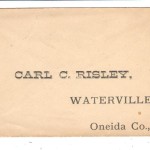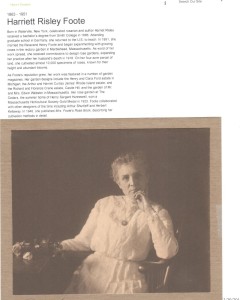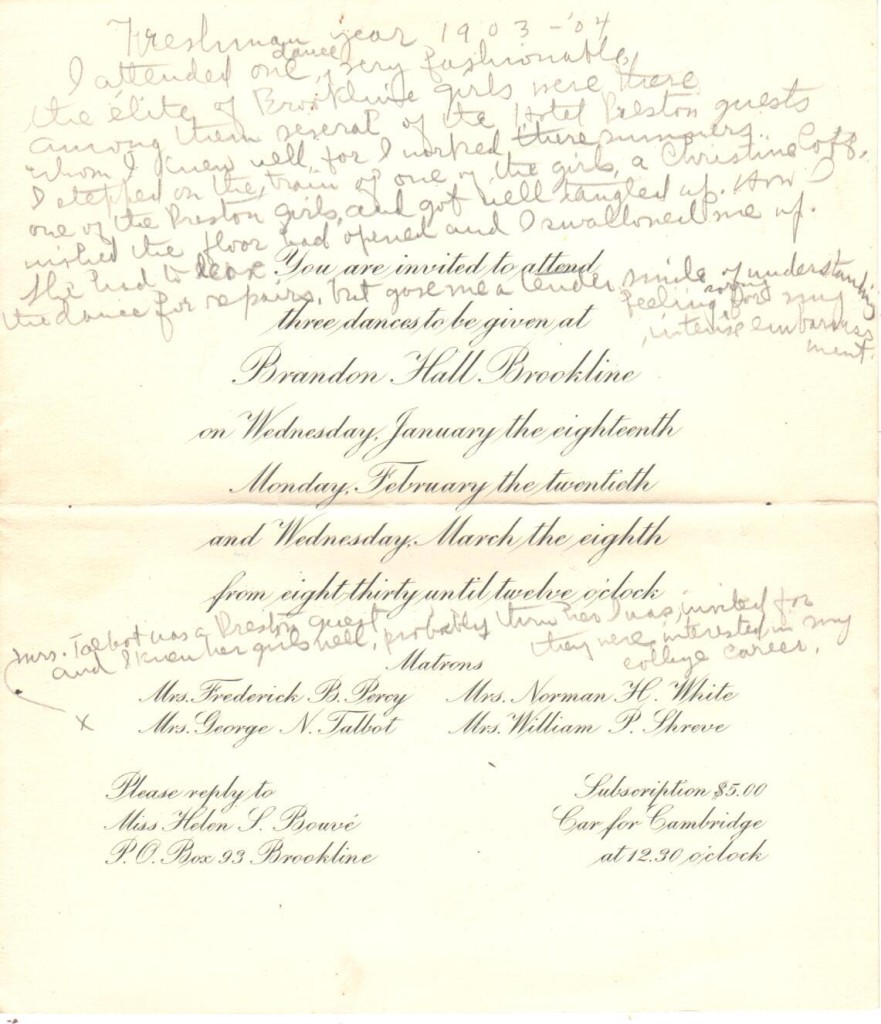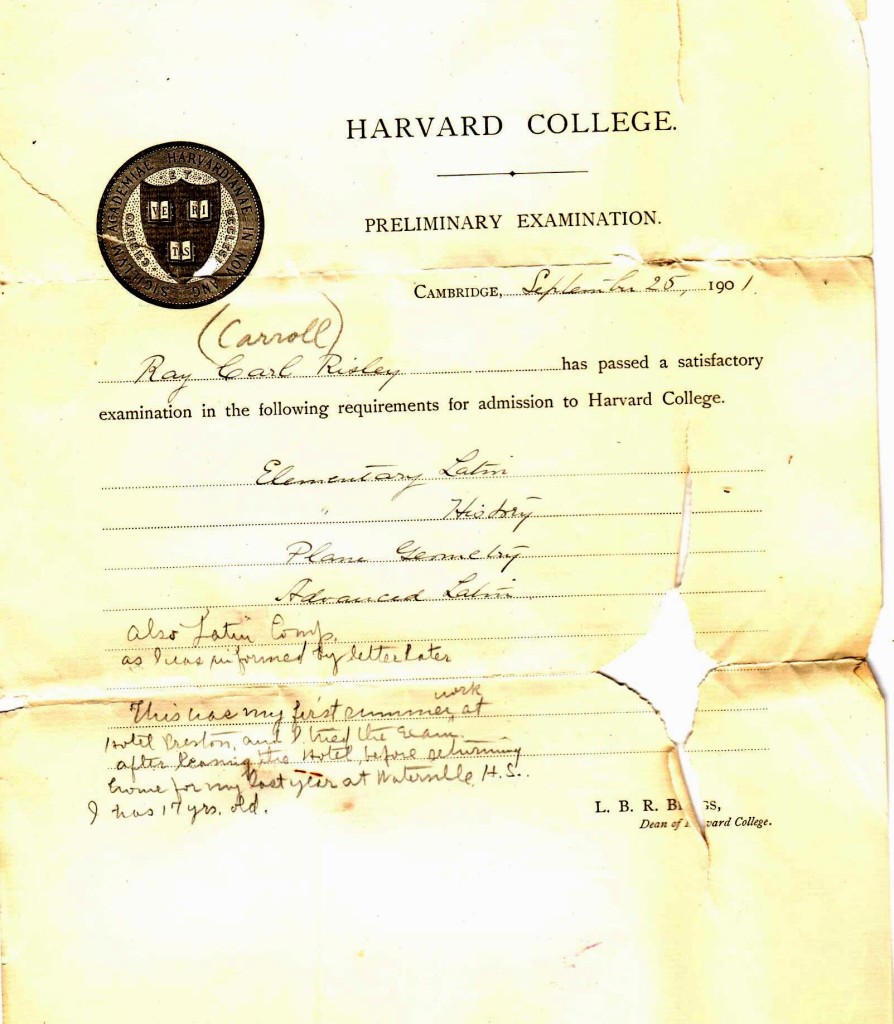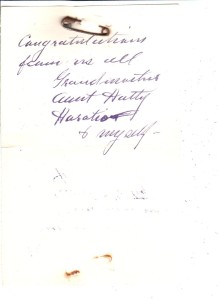A Summer Job at a Summer Place
“Don’t marry money — Go where money is, then fall in love.” My grandfather, always quick with advice to others, offered this homily to his son some years later.
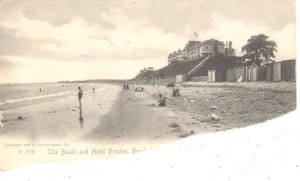
Preston Hotel : One of many upscale resorts for Bostonians vacationing on the shore. I note that whatever message had been written on the card was later torn from the bottom.
It was at the Preston Hotel that my grandfather followed this advice for the first and apparently only time in his life– to the letter– with the consequences anticipated but not in the way foreseen or intended. But that was several Summers in the future.
In 1901, after his third year attending high school he took his first Summer job away from his home in upstate New York to work at this New England resort.
Here at The Preston even the position of towel boy, beach boy, bathing attendant, or lifeguard, required a ‘referral.’ Proper Bostonian sensibilities expected no less. Young Ray Carroll Risley had two copper bottomed references to help him make his way in this world: His uncle was a rising member of the New York State Senate from Oneida County in the agrarian center of the State.
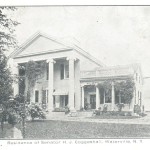
Ray Carroll’s Uncle resided in a home that came with his wife, Rena Terry. He was dean of the state senate when he died in 1907.
Waterville called itself ‘The Hop Capitol of the World,‘ and H. G. Coggeshall was a member of the reform wing of the Republican Party.
My grandfather idolized Theodore Roosevelt and was an ardent reform republican from the time he was able to take an interest in politics.
As Governor, Roosevelt had been so annoying to the Conservatives in the State that the Republican Party denied him a chance to run for a second term. To the reformist Sen. Coggeshall and his young nephew (and possible protege) this was a great disappointment. Instead of keeping an activist and popular Governor the Conservatives ‘promoted’ Roosevelt at the National Convention, to run for the Vice-Presidency with William McKinley on the Republican Ticket in the election of 1900. McKinley was re-elected. Now, in September of 1901, Roosevelt was certain sure that his career in politics was over as he whiled away the time in Washington.
For Ray Carrol’s purposes, Sen. Coggeshall’s recommendation had value. However, in the area around Boston, It was more important to have the endorsement of his Aunt Hattie.
Ray Carroll’s late father, C. C. Risley, had been a Hop grower in Waterville. His sister, Harriett Risley Foote had been born two years before Lincoln was assassinated. She had attended Waterville Academy and Smith College before going to Germany to further her education in 1886.
My great great Aunt Hattie had returned to America in 1891 and had married an Episcopal Minister, Henry Lewis Foote. He was Rector of St Michael’s church in nearby Marblehead from 1895 –1906. He and his wife lived in the rectory. Aunt Hattie was also a horticulturalist of renown in the cultivation of hybrid tea roses. Starting out in the rectory garden she eventually was commissioned to design and grow rose gardens for the likes of Henry Ford.
I assume her political leanings were also Republican and ‘progressive,’ notwithstanding the society she kept in Marblehead and clients for whose estates she provided rose gardens. I do know she was a gentle and devout lady. I met her for the first time in 1948 when I was five. I also have a Book of Psalms she had given my father, to comfort him and help keep him safe when he went off to war in 1943.
My grandfather and his references impressed the management of the Hotel and he rose through the staff ranks during the Summers he worked there. He must also have made a favorable impression on the vacationing guests and on their young daughters as well.
Two years later these same Matrons (as noted below) wrote to him– at least to the point of sending him invitations to social and charitable events they sponsored.
Along with other Harvard freshmen they had him down as just another acceptable young gentleman for the stag line. The invitations were either buff colored, or white, some deckle-edged, and engraved. My grandfather made note of the committee women’s names and saw fit to save these youthful mementos of cotillions, tea dances , and announcements of other socializing events, over the years. They have come down to me.
At the end of the Summer of 1901 he was to return to Waterville for his last year of high school. On the way he stopped over in Cambridge, Massachusetts, to apply for early acceptance. He may have already had his plan, and it may not have been in favor of Dartmouth, Amherst, or Williams. Aunt Hattie had mentioned in an earlier letter these schools specifically. She may have felt their agenda was more social progressive and, as such, more suitable for her nephew. Or she, as a Smith College Alumna herself, may just have felt a fondness for those schools situated along the Connecticut River in Central New England’s Pioneer Valley.
My Grandfather later told his son, Carl, that the vacationing mothers he met while working at The Preston, had him down as an eligible young man with a future. He was told that it would be a shame if he didn’t choose a school nearer to the opportunities available educationally, professionally and socially– only in Boston. To my grandfather the choice may have been awkward. Even with the mentoring of H. G. Coggeshall, ‘The Hop Capital of the World’ must have looked flat against ‘The City on the Hill.’ While outsiders may have referred to their city as Bean Town. Proper Bostonians modestly referred to their city as the, ‘Athens of America.’
So, in early September, Ray Carroll stopped in Cambridge, took some tests, returned to Waterville to complete his high school education, only to find that the unthinkable had happened and the world had changed.
From the dead end job of Vice-President, Theodore Roosevelt had been catapulted into the Presidency with the assassination of William McKinley in Buffalo, New York, on the fifth of September.
It would be anticlimactic few days later when he got a letter from Harvard with the results of his exams:
No mention is made of the circumstances of McKinley’s death in the documents I’ve had come down to me– Presumably because Coggeshall and his young nephew, in their sense of propriety, wanted to conceal their unsorrow at the ironic turn of events.
Here the Conservatives had tried to muzzle Roosevelt and get him out of New York only to see him, now with the power of the President, unleashed upon the entire Nation.
However, my grandfatherdid attached the note shown below to the Harvard acceptance letter with a now rusted safety-pin. He had kept the two documents safe with his other, important ‘souvenirs.’
Aunt Hattie and her family saw no reason not to show happiness and to congratulate their favorite on his good fortune.
In the note I find the first ‘presence’ of Emma Schumaker who signs herself as ‘Myself.’ Emma came back with Aunt Hattie when she returned from her studies in Germany in 1891 to marry Henry Foote.
I do not know if they had a ‘Boston Marriage,’ but Emma remained on as secretary, housekeeper and companion as they grew old together (Henry Foote died in 1918.) In correspondence from individuals in matters concerning the Rose Business, Emma is often referred to as, ‘Your Associate,” or as, “Miss Schumaker,” or as just, “Emma.” She was evidently much appreciated.
The note celebrates this important development in my grandfather’s young life.

